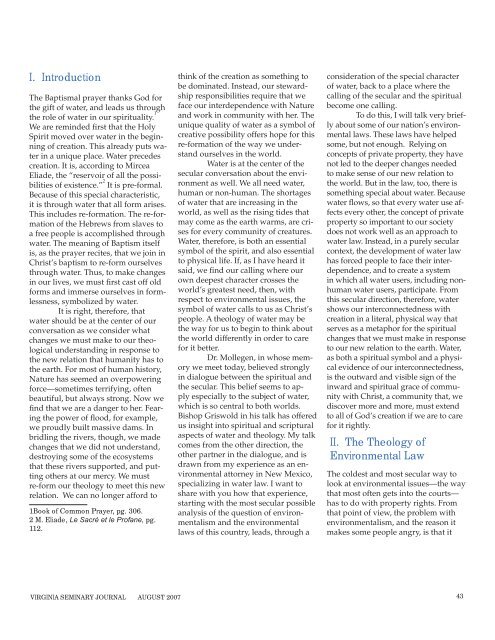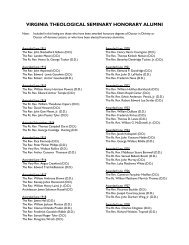Seminary Journal 2008 (August) - Virginia Theological Seminary
Seminary Journal 2008 (August) - Virginia Theological Seminary
Seminary Journal 2008 (August) - Virginia Theological Seminary
You also want an ePaper? Increase the reach of your titles
YUMPU automatically turns print PDFs into web optimized ePapers that Google loves.
I. Introduction<br />
The Baptismal prayer thanks God for<br />
the gift of water, and leads us through<br />
the role of water in our spirituality. 1<br />
We are reminded fi rst that the Holy<br />
Spirit moved over water in the beginning<br />
of creation. This already puts water<br />
in a unique place. Water precedes<br />
creation. It is, according to Mircea<br />
Eliade, the “reservoir of all the possibilities<br />
of existence.” 2<br />
It is pre-formal.<br />
Because of this special characteristic,<br />
it is through water that all form arises.<br />
This includes re-formation. The re-formation<br />
of the Hebrews from slaves to<br />
a free people is accomplished through<br />
water. The meaning of Baptism itself<br />
is, as the prayer recites, that we join in<br />
Christ’s baptism to re-form ourselves<br />
through water. Thus, to make changes<br />
in our lives, we must fi rst cast off old<br />
forms and immerse ourselves in formlessness,<br />
symbolized by water.<br />
It is right, therefore, that<br />
water should be at the center of our<br />
conversation as we consider what<br />
changes we must make to our theological<br />
understanding in response to<br />
the new relation that humanity has to<br />
the earth. For most of human history,<br />
Nature has seemed an overpowering<br />
force—sometimes terrifying, often<br />
beautiful, but always strong. Now we<br />
fi nd that we are a danger to her. Fearing<br />
the power of fl ood, for example,<br />
we proudly built massive dams. In<br />
bridling the rivers, though, we made<br />
changes that we did not understand,<br />
destroying some of the ecosystems<br />
that these rivers supported, and putting<br />
others at our mercy. We must<br />
re-form our theology to meet this new<br />
relation. We can no longer afford to<br />
1Book of Common Prayer, pg. 306.<br />
2 M. Eliade, Le Sacré et le Profane, pg.<br />
112.<br />
VIRGINIA SEMINARY JOURNAL AUGUST 2007<br />
think of the creation as something to<br />
be dominated. Instead, our stewardship<br />
responsibilities require that we<br />
face our interdependence with Nature<br />
and work in community with her. The<br />
unique quality of water as a symbol of<br />
creative possibility offers hope for this<br />
re-formation of the way we understand<br />
ourselves in the world.<br />
Water is at the center of the<br />
secular conversation about the environment<br />
as well. We all need water,<br />
human or non-human. The shortages<br />
of water that are increasing in the<br />
world, as well as the rising tides that<br />
may come as the earth warms, are crises<br />
for every community of creatures.<br />
Water, therefore, is both an essential<br />
symbol of the spirit, and also essential<br />
to physical life. If, as I have heard it<br />
said, we fi nd our calling where our<br />
own deepest character crosses the<br />
world’s greatest need, then, with<br />
respect to environmental issues, the<br />
symbol of water calls to us as Christ’s<br />
people. A theology of water may be<br />
the way for us to begin to think about<br />
the world differently in order to care<br />
for it better.<br />
Dr. Mollegen, in whose memory<br />
we meet today, believed strongly<br />
in dialogue between the spiritual and<br />
the secular. This belief seems to apply<br />
especially to the subject of water,<br />
which is so central to both worlds.<br />
Bishop Griswold in his talk has offered<br />
us insight into spiritual and scriptural<br />
aspects of water and theology. My talk<br />
comes from the other direction, the<br />
other partner in the dialogue, and is<br />
drawn from my experience as an environmental<br />
attorney in New Mexico,<br />
specializing in water law. I want to<br />
share with you how that experience,<br />
starting with the most secular possible<br />
analysis of the question of environmentalism<br />
and the environmental<br />
laws of this country, leads, through a<br />
consideration of the special character<br />
of water, back to a place where the<br />
calling of the secular and the spiritual<br />
become one calling.<br />
To do this, I will talk very briefly<br />
about some of our nation’s environmental<br />
laws. These laws have helped<br />
some, but not enough. Relying on<br />
concepts of private property, they have<br />
not led to the deeper changes needed<br />
to make sense of our new relation to<br />
the world. But in the law, too, there is<br />
something special about water. Because<br />
water fl ows, so that every water use affects<br />
every other, the concept of private<br />
property so important to our society<br />
does not work well as an approach to<br />
water law. Instead, in a purely secular<br />
context, the development of water law<br />
has forced people to face their interdependence,<br />
and to create a system<br />
in which all water users, including nonhuman<br />
water users, participate. From<br />
this secular direction, therefore, water<br />
shows our interconnectedness with<br />
creation in a literal, physical way that<br />
serves as a metaphor for the spiritual<br />
changes that we must make in response<br />
to our new relation to the earth. Water,<br />
as both a spiritual symbol and a physical<br />
evidence of our interconnectedness,<br />
is the outward and visible sign of the<br />
inward and spiritual grace of community<br />
with Christ, a community that, we<br />
discover more and more, must extend<br />
to all of God’s creation if we are to care<br />
for it rightly.<br />
II. The Theology of<br />
Environmental Law<br />
The coldest and most secular way to<br />
look at environmental issues—the way<br />
that most often gets into the courts—<br />
has to do with property rights. From<br />
that point of view, the problem with<br />
environmentalism, and the reason it<br />
makes some people angry, is that it<br />
43



